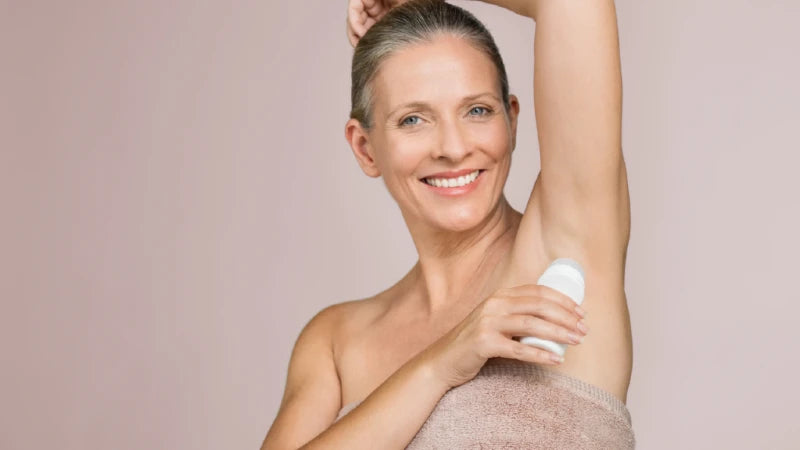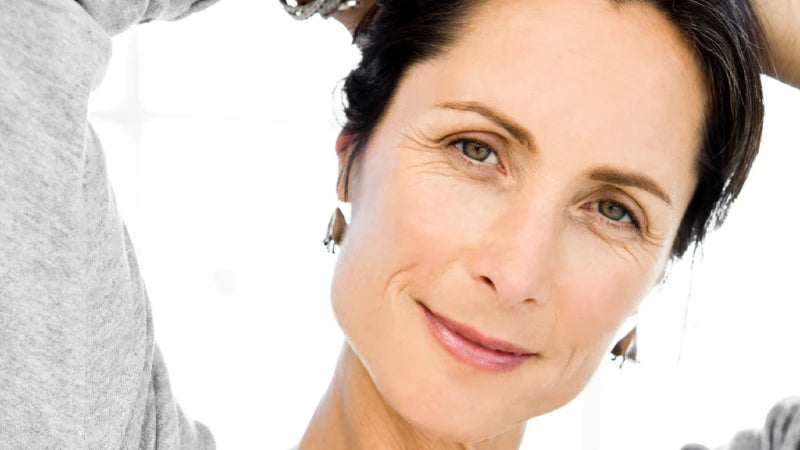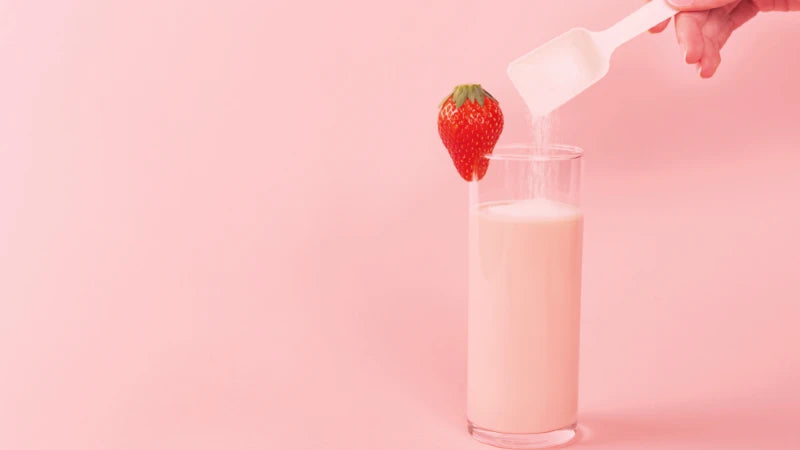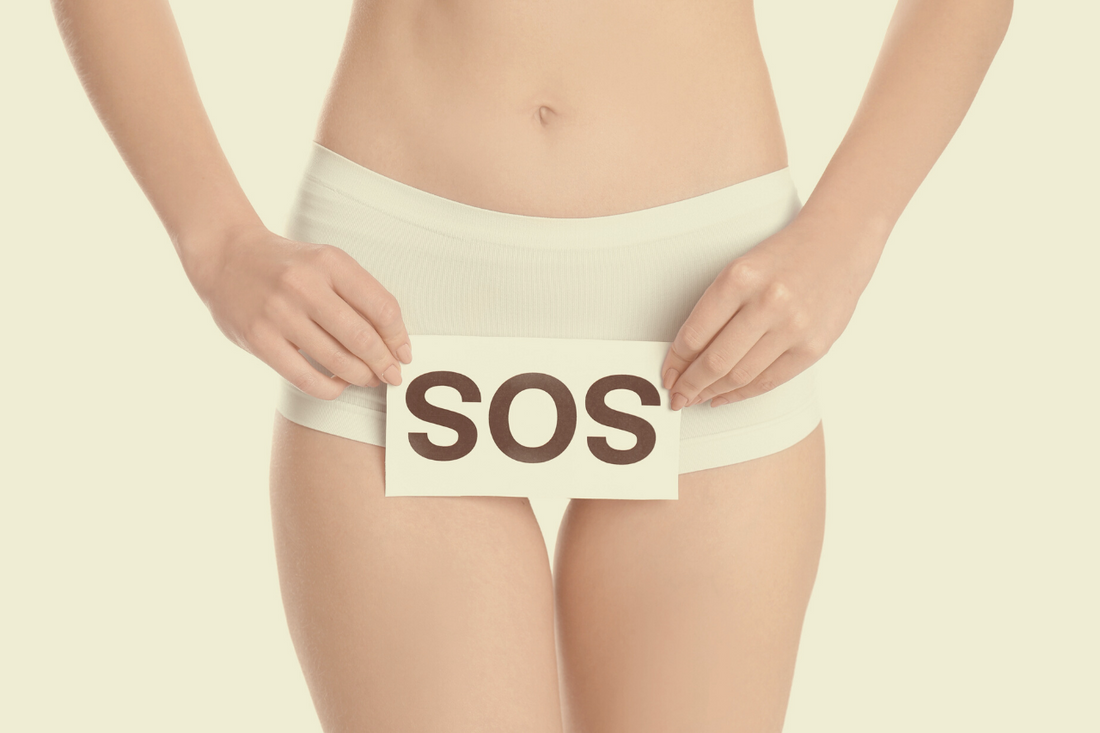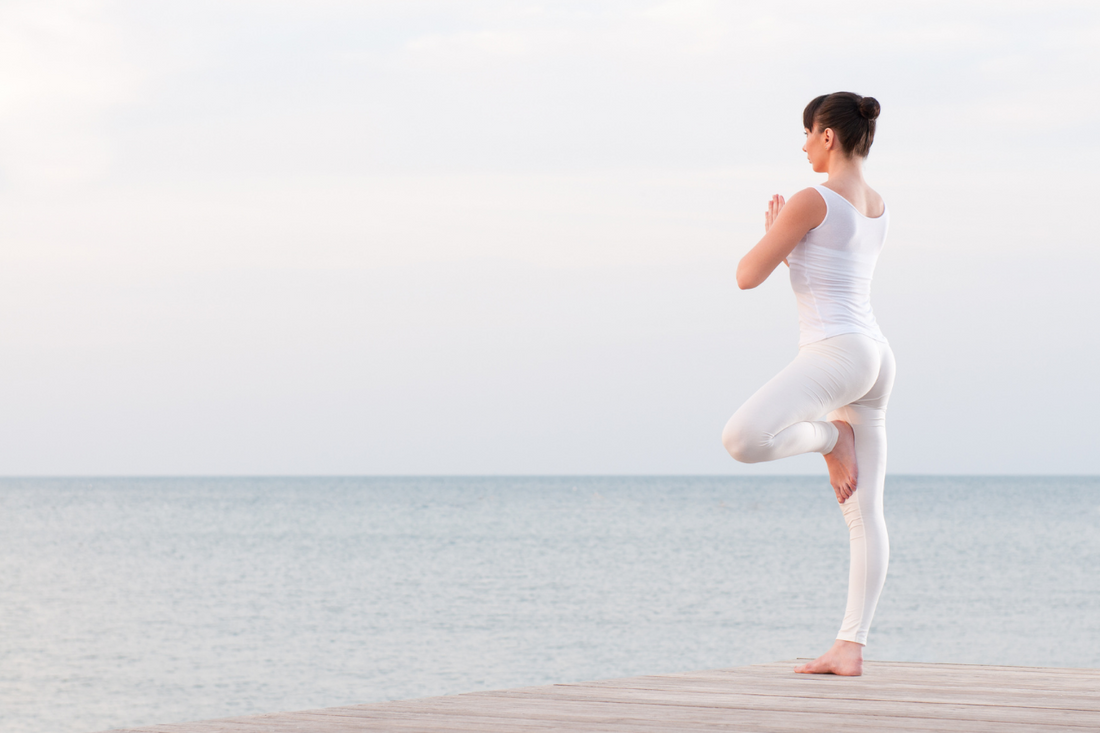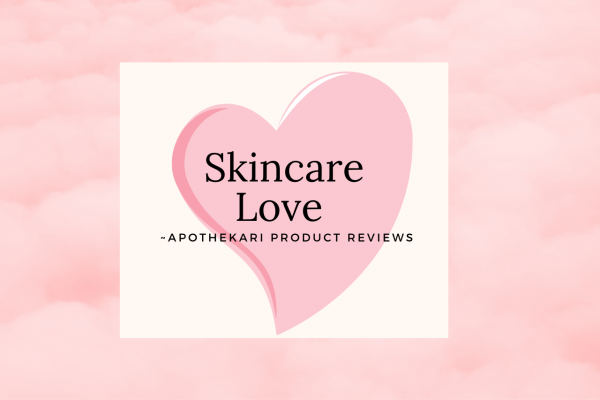Blog
5 Tips to Help You Care for Your Menopause Skin
Menopause marks the date one year after a woman’s last period and it can bring about some noticeable, and often, unwanted changes to your skin and hair. Yup, that includes the dreaded chin hairs! Menopause skin’s appearance can change for many reasons and we’ve written about that before. The production of hormones—our body’s chemical messengers—may increase or decrease, and, the impact of your lifestyle and genes are bound to catch up with you. Shop Intimate Care Feminine Moisturizer Shop Active Treatment Serums These 3 Hormones Have the Most Impact on Your Menopause Skin Our bodies produce lots of hormones, but these 3 are most implicated in the skin changes you may notice. 1. Estrogen The mother of hormones in women, estrogen levels decrease as you age, leading to a drop in collagen and elastin production. Menopause skin ends up being thinner, saggier and more wrinkled. It also becomes drier because estrogen is involved in the production of hyaluronic acid, which helps to keep the skin moist. This can affect the skin not only on your face, but also on the rest of your body and is one of the reasons that so many women experience vaginal dryness as they transition to menopause. 2. Progesterone Like estrogen, progesterone levels drop with age. This hormone has been shown to increase skin thickness and elasticity so a decline will have a noticeable impact on your skin. 3. Testosterone Thought acne was something you only had to suffer through your teen years? Sadly, aging tends to increase testosterone levels and is a reason why women may suffer with acne and blemishes at midlife. Chin hairs? You can blame testosterone for those as well! Ready for better skin? Sign up to our newsletter and take advantage of the tips we’re sharing to help you treat the skin on all your body’s places and age with confidence, comfort and grace. Plus get 10% off your first order! 5 Tips for Radiant, Glowing Menopausal Skin 1. Wear Sunscreen Every Day (And consider adding in an antioxidant) Sun damage accounts for over 80% of skin damage–unprotected exposure to ultraviolet rays contributes to brown spots, thinning skin, dryness and wrinkles. Find a good broad-spectrum sunscreen, with a minimum SPF 30 protection and use it every day, year round. Even in the winter, on cloudy days and when sitting next to a window, long-penetrating UVA rays can lead to damage. Layer on an antioxidant along with your sunscreen to help boost protection against the damaging impact of UV rays—they result in free radicals, unstable molecules that harm skin. There are lots of antioxidants you can choose, green tea, reservatrol, coenzyme Q10, ferulic acid. We love them all but especially vitamin C because it has oodles of research to support its benefits in boosting collagen production, brightening the skin and evening out its tone. You can never use too many antioxidants – the more the merrier! Check out our Bespoke Vitamin C Serum, made with a cocktail of antioxidants and other skin beneficial ingredients to help make your skin glow. 2. What is the Best Moisturizer for Menopause Skin? Menopause skin is drier for several reasons, including a decreased ability to hold onto moisture. It can be an issue especially in areas where the air is dry. Moisturize as much as you need, making sure to include these 3 types of ingredients: Humectants. Water loving ingredients that draw moisture into the skin’s top layer. ie. Hyaluronic acid, glycerin, propanediol Emollients. Prevent water loss and help soften and sooth skin. ie. Oils and butters including shea, squalene, fatty acids and fatty alcohols. Occlusives. Provide a physical barrier to help prevent water loss, while also protecting the skin from external irritants. ie. Waxes, some oils and petrolatum. *some ingredients can be both emollient and occlusive (caprylic/capric triglyceride, glyceryl stearate, squalene, shea butter, etc) Many moisturizers, including our Daily Infusion Moisturizer contain a combination of these 3 ingredients. Especially dry skin can benefit from layering—start off with a serum, follow with a moisturizer and then end with an oil like our Antioxidant Face Oil. 3. Become Friends With a Retinoid Retinoids are backed by multiple studies that show their benefits in helping to reduce fine lines and wrinkles by boosting collagen and elastin production. They also help to increase skin cell turnover, fade age spots, even out pigmentation and soften skin. Give it time – you’ll notice benefits with 3 to 6 months of regular use. Retinoids can irritate skin, so you may want to introduce them gradually. We’re big fans of retinaldehyde, found in our A is for Anti-Aging Serum because it is the most gentle, yet still highly effective form of retinoid. Retinaldehyde also decreases oil production and has antibacterial effects so it can also help to manage blemishes that many women experience at midlife. 4. Be Gentle You may be tempted to throw the kitchen sink at your menopause skin, but too much, is definitely too much! Be selective with the products you choose, watching out especially for those that contain irritating ingredients like drying alcohols and fragrances. Go easy on acids, which can thin skin leaving it open to irritation from external irritants; use gentle cleansers, especially if you have dry skin. And use warm, not hot to shower and wash your face. 5. Pay Attention to the Skin on All Your Body’s Places You pay attention to your face, but are you looking after the skin on the rest of your body? Dry skin is an issue in places you may not have considered—that includes vaginal dryness, which more than 50% of women suffer with during perimenopause and menopause. The burning, itching and painful intercourse associated with vaginal and vulvar dryness can be treated with a vaginal moisturizer. More Than Lip Service is made with hyaluronic acid (an ingredient that hydrates skin and which naturally declines as we age) and vitamin E, to give fast, long-lasting & hormone-free relief from the burning, itching & pain associated with vaginal atrophy, vulvar and vaginal dryness. In clinical studies, the combination was shown to be just as effective as hormonal options, without the risk of side effects associated with hormonal solutions. And, unlike many lubricants that just slip right out, ours not only immediately alleviates dryness symptoms but also lasts so long, you may not even need to use it every day.
Learn moreSweat Facts: 7 Things We Need to Clear Up About Your Deodorant
Let’s talk about sweat facts. In particular, many of the myths surrounding natural deodorants. Because when it comes to this topic, there’s no shortage of information on the internet. Sadly, many of them make no sense at all. We’re discussing 7 that it’s time to bust. Let’s go! Shop All Apothekari Natural Deodorants For EVERYTHING you wanted to know about natural deodorant, read this post. Why Do We Sweat? Facts When it comes to sweating and body odor, there are lots of misconceptions. Time to set the facts straight. Myth 1: Do You Have to Detox Before Using a Natural Deodorant? One of the biggest cringeworthy sweat facts advice floating around is that when it comes to using deodorants is that you need to do a ‘detox’ when switching over from an antiperspirant to a deodorant. Truth: First, your skin isn’t a “detox” organ. That’s what our livers are for. The main purpose of skin is to act as a barrier – keeping harmful substances out and the good ones in. Second, there’s absolutely no evidence to support the notion of detox when it comes to deodorant. As you transition over from using an anti-perspirant to a deodorant, the antiperspirant plugs that block sweat glands will dissipate until they are no longer blocking the glands. This occurs naturally and there’s nothing you can do to help the process along. You may start sweating more. And, the bacteria that live on your skin will feed on this sweat, leading to odor. Enter your deodorant. It’s as simple as stopping the antiperspirant one day and applying a deodorant the next. No product is required to help the process along. Myth 2: Is It Safe to Use Baking Soda As a Deodorant? The truth? Baking soda may be good for cleaning your kitchen sink, but it’s an ingredient that you should avoid putting on your skin. Baking soda (also known as sodium bicarbonate) has a high pH. This makes it highly irritating to skin, which is slightly acidic (much lower pH). Applying baking soda not only disrupts the skin’s pH, it also disturbs your skin’s protective barrier and its microbiome (the collection of bacteria that help keep skin healthy). It can be very irritating, leading to rashes, redness or burning. Myth 3: Is Magnesium Hydroxide Safe in Deodorant? Truth: The pH of magnesium hydroxide is even higher than that of baking soda, making it potentially even more irritating than baking soda! (so the answer is no!) Myth 4: Can You Use Kaolin Clay in Deodorant? Yes, you can because kaolin clay absorbs wetness, thereby reducing odor. Truth: Here’s the problem—If you’ve switched to a deodorant because you want to avoid the aluminum in an anti-perspirant, you may be interested to learn that kaolin clay is made up of several minerals including kaolin, silicon and aluminum!If you’re trying to avoid aluminum, you should avoid deodorants containing kaolin clay as well. Myth 5: Are Parabens Linked to Cancer? Parabens are a class of highly effective preservatives used to keep foods and cosmetics safe. A 2004 British study found traces of parabens in the breast tissue of 19 out of 20 women. And, because parabens have some mild estrogenic effect, some researchers concluded that parabens are linked to breast cancer and reproductive issues. Truth: Although it’s often touted about as a scientific sweat fact, it’s important to note that parabens are included in cosmetics at very low percentages and that their estrogenic effect is very, very mild. Parabens are also found naturally in foods. Estrogen can play a role in breast cancer, but there is no evidence that people who use paraben-containing products face an increased risk. We can’t say that they’re categorically bad for us, but if you are concerned, other preservatives are available. All Apothekari products are paraben free. Myth 6: Is Aluminum in Deodorant Harmful? Truth: While it’s been suggested that there’s a possible connection between aluminum and breast cancer, there’s no scientific evidence that links its use to the development of breast cancer. In fact, a 2014 review concluded there was no clear evidence showing that the use of aluminum-containing underarm antiperspirants or cosmetics increases the risk of breast cancer (5) Willhite CC, Karyakina NA, Yokel RA, et al. Systematic review of potential health risks posed by pharmaceutical, occupational and consumer exposures to metallic and nanoscale aluminum, aluminum oxides, aluminum hydroxide and its soluble salts. Critical Reviews in Toxicology 2014; 44 Suppl 4:1-80. The Alzheimer’s concern? A few studies from the 1960s found high levels of aluminum in the brains of Alzheimer’s patients. But the findings haven’t been replicated in later research and the conclusion is that there isn’t any link between the two. The real problem with aluminum? It stains your white clothes yellow. And, many people are sensitive to it. These are the real reasons to avoid using aluminum. You’ll be pleased to know that Apothekari deodorants are aluminum free. Myth 7: Do You Really Need to Use Deodorant? I absolutely (DEFINITELY) need it, but you may not! Truth: Research has shown that if you possess a gene called ABCC11, that you may not need a deodorant! Researchers have known about this gene for a while, although most of the work on it has focused on its connection to earwax–people with this gene variant are more likely to have “dry” earwax, compared to “wet” or “sticky”. Although researchers aren’t quite sure how the gene affects both earwax and sweat odor, they believe it has to do with the production of amino acids. When it comes to body odor, the presence of this gene means your armpits produce less of an amino acid that leads to bacteria growth. These bacteria, when combined with sweat, lead to body odor. Fewer bacteria, less odor. It’s thought that only 2 percent or so of the population have this gene and that it’s more common in East Asian populations. Maybe you want to go au naturale to see if you can give it a miss? Any Other Sweat Facts You’d Like to Know? I hope that this post has helped to provide some clarity around the confusion about deodorants. Let us know if you have any questions and we’ll be happy to help.
Learn moreWhat's the Best Way to Layer Skincare Products?
We’ve written about how to layer skincare products before, and this time we’re going a bit deeper. In this post, learn how to layer skincare products the right way to help maximize the benefits of your topical treatments. Shop Antioxidant Face Oil When Should Oil Be Used in Skincare Routine? So you may get some conflicting advice when it comes to when to apply a face oil. Some advise to apply oil before moisturizer, so that it absorbs right into your skin before you slather on more hydration. Others say to apply it after your moisturizer, so that it can help to lock in the hydrating ingredients. To us, it makes more sense to do the latter – apply it after your moisturizer so that it seals everything in. But, if you read our entire blog post, you’ll know that there really isn’t a perfect answer. Just use the face oil! What is the Order of Skin Care Layers? You’d think that a topic like how to build a skincare routine would be relatively easy. Yet, with all the options available to choose from – creams, serums, toners, essences, oils, etc., – finding the right products for your skin can get complicated. Add in how to use these products to maximize their benefits, well that just adds another level of complexity. If you’ve already got a good skincare routine set up and want to learn the best way to layer skincare products, know that the advice is more a rule of thumb rather than anything set in stone. The most common recommendation is to go from thinnest in texture to heaviest in texture, but even if you get it wrong, nothing bad will happen. Breathe a sigh of relief! Want to get the glowing skin of your dreams? Subscribe to our newsletter list and download our free guide: 5 Tips For Glowing Skin. How Important Are the Steps for a Skincare Routine? In general, it’s recommended that you apply your products in order from thinnest to thickest. The rationale is that this helps to ensure the best possible absorption. However, if you mess things up, and the order gets switched around, it’s unlikely to do much harm. That’s because very few products create a bulletproof layer that nothing can penetrate. So, even if you put your heavy cream on before a hydrating serum, the world won’t end. The absorption of that serum through the cream may happen a lot more slowly and you may not get as much to your skin as you would have if you’d applied it first. Additionally, since the goal of the cream is to help lock in the hydration from the serum, you may lose that benefit as well. The same applies to active treatment serums. Ideally, you’ll want the ingredients as close to your skin as possible (think vitamin C, retinoids etc) so it’s best to apply these first for maximum absorption. Then follow with a cream, lotion or oil. Here’s the Correct Order of Skin Care Products Cleanser. It probably doesn’t come as a surprise that cleansers top the list. Single cleanse, double cleanse, warm water splash (often this is fine for many of us in the morning), it should always be the first step. Toner. We’ve always maintained that toners are optional. Not everyone needs to use them and they’re one of the products that you can leave out of your routine easily. However, toners can be useful to help introduce active ingredients like those found in acne treatments. Serum/Exfoliant. Exfoliants and serums like our Bespoke Vitamin C Serum or A is for Anti-Aging Serum often contain lots of active ingredients like antioxidants, retinoids and peptides so it’s a good idea to apply them as close to clean skin as possible. They’re the products that deliver the most skin benefits so it’s important to ensure their optimal absorption. Moisturizer. Whether you opt for a cream or a lotion, moisturizers help to hydrate and plump skin. They can also help to lock in moisture, preventing dry skin. Eye Cream. Sunscreen (AM)/Face Oil (PM). Sunscreen should always be your last step in the morning before you apply make-up. At night, face oil is the very last thing to put on before you get your zzz’s in. If you want to use a face oil in the morning, put it on before your sunscreen. Remember not to apply too much, especially if you’re layering as your skin can only absorb so much. Let us know if you found this helpful.
Learn moreDo Collagen Skin Supplements Give You More Healthy Skin?
Collagen skin supplements are everywhere these days – are they really the promised ‘Fountain of Youth’, or just more hype? In this post, we’re looking at the research to help you decide if taking a collagen supplement makes sense for healthier skin. Can You Rebuild Collagen in Your Skin? Collagen skin supplements are everywhere these days – are they really the promised ‘Fountain of Youth’, or just more hype? In this post, we’re looking at the research to help you decide if taking a collagen supplement makes sense for healthier skin. When it comes to boosting the production of collagen with skincare products, nothing has more research to support this benefit than retinoids. Derived from vitamin A, retinoids like the gentle, yet effective retinadehyde, found in our A is for Anti-Aging Serum, boost collagen production and help prevent its destruction. Retinaldehyde also increases skin cell turnover, and improves skin tone and texture. And, it helps to minimize oil production, decreasing the appearance of pore size and keeping skin blemish free. Don’t you think it deserves a place in your skin care arsenal? Shop A Is for Anti-Aging Serum (Our Retinoid Formulation) Does Collagen Do Anything for Your Skin? Collagen is a protein and the one most abundant in our bodies. Think of it as the glue that holds everything in your body together keeping your tendons, bones, ligaments, joints and your skin, in good shape. Working in conjunction with another protein, elastin, it also helps to keep your skin looking plump and line free. 75% of the dry weight of your skin is made up of collagen, which is rich in amino acids, the building blocks for protein. Unfortunately, as you get older, your body breaks down collagen faster than you can replace it. External factors like sunlight, pollution and smoking, along with a diet high in sugar and refined carbohydrates, can accelerate its decline and impair its repair. Want to get the glowing skin of your dreams? Subscribe to our newsletter list and download our free guide: 5 Tips to Healthy, Glowing 40+ Skin Is It Worth Buying Collagen Supplements? How to Choose One Collagen skin supplements have been promoted as a way to help make up for the loss that you experience as you age. But do they work? A 2019 literature review in the Journal of Drugs in Dermatology found some data to support that collagen could increase skin elasticity, collagen density and overall hydration.* Additionally, supplementation has been shown to help with arthritis pain and sports related joint pain. Many experts believe that the data is promising. And while they are noticing patient benefits, they’d like to see more studies before giving supplements a firm thumbs up. There don’t seem to be any downsides associated with the use of collagen skin supplements so if you’re interested in giving them a try, here are some tips on finding one that’s safe and effective: Look for a high quality source to ensure lack of contamination from heavy metals. The USP and NSF labels in the USA or an NPN number in Canada, mean that the product has been reviewed to meet safety and quality standards. Buy from a reputable company. Do they follow standards like Good Manufacturing Practices (GMP)? Do they offer good customer service policies? Organic, grass fed or pastured may be a good idea, to minimize the risk of BSE. Wild caught fish is another great source. Seek out hydrolyzed collagen or collagen peptides, which are collagen proteins that have been broken down into smaller, more easily absorbed forms. What About Vegan Collagen? Vegan collagen sources don’t exist. However, plant based foods, like spinach, beans, soy, avocados and sunflower seeds, can help to boost your body’s production of collagen. Foods high in vitamin C also play a role in collagen production. Does Collagen Cream Really Work? Since ingesting collagen shows promise, you may think that it’s a good idea to apply it topically. Not so fast! Collagen is a large molecule and while it’s a great moisturizing ingredient, it doesn’t absorb well into skin and cannot replenish lost collagen. The best way to boost collagen production in skin is by using a topical retinoid, like the retinaldehyde found in our A is for Anti-Aging Serum. It works to help boost collagen levels in the skin by increasing the lifespan of collagen, as well as by blocking certain enzymes that destroy collagen. In addition, retinaldehyde can also help facilitate skin cell turnover, improve skin tone and texture, even decrease the appearance of pore size. How Do You Preserve Collagen in Your Skin? These tips will help to prevent collagen degradation: Wear sunscreen every single day to protect skin against UV rays, which break down collagen fibers Consider adding in peptides to help stimulate collagen and elastin production in the skin Use a vitamin C serum, which also helps to boost collagen production *J Drugs Dermatol. 2019 Jan 1;18(1):9-16. Oral Collagen Supplementation: A Systematic Review of Dermatological Applications (Franchesca D. Choi, Calvin T. Sung, Margit L.W. Juhasz, Natasha Atanaskova Mesinkovsk)
Learn more7 Reasons Why You've Got Dull Skin. Let's Get Your Glow Back
If you have dull skin, you need to know that all is not lost. Dull skin is fixable! In this post, we’re diving into why your skin is dull and sharing tips on how to get your radiant glow back. Vitamin C Matters! Vitamin C is one of the ingredients most well known to help revive dull skin into radiant, glowing skin. It is found in our skin’s outermost layers (epidermis and dermis) but it depletes as we get older. Sun damage and pollution can accelerate this decline, leading to skin that looks and feels dull, uneven and less firm. Replenish it with our Bespoke Vitamin C Serum, available in two concentrations 10% (for sensitive skin) and 15% (for normal/tolerant skin). Shop Bespoke Vitamin C 15% Shop Bespoke Vitamin C 10% Why Does My Skin Look Dull and Tired? 7 Reasons 1. You’re Drowning In Dead Skin Cells I know, ewww….You may not know it, but we shed millions of skin cells each day. Most of them just stay put at the top of our skin’s surface, acting like a fine layer of dust, leaving us with skin that looks dull and grey. The Fix? Exfoliate. Remove the dead, dry skin cells so that the new ones can shine through. Ingredients like alpha hydroxy acids and vitamin c (l-ascorbic acid) found in our Bespoke Vitamin C Serum, help to dissolve the dead skin cells, leaving you with brighter looking skin. Scrubs work too (manual exfoliation), but it’s easy to apply too much pressure so we recommend sticking with treatments (like serums) that ‘dissolve’ the skin cells instead. 2. Pollution Every time we step outside, we’re exposing our skin to polluted air, which contains dirt and gases like nitrogen dioxide, ozone, carbon monoxide and sulfur dioxide, which are harmful to skin. These can lead to the development of free radicals. Over time, free radicals damage skin, leading to wrinkles and fine lines plus pigmentation. This uneven skin tone and texture, diffuses light and leaving skin looking dull. The Fix? Wash your face every night to remove dirt and makeup, which can damage skin while you sleep. 3. You’re Stressed Out Stress is inevitable for most of us. It has an impact on our overall wellness and also on our skin. Prolonged stress not only makes you more tired over time, it also impacts the levels of the stress hormone cortisol, along with adrenaline. Increased levels of these hormones caus our heart rate to go up, our blood pressure to rise and sugar to accumulate in our bloodstream. Cortisol increases oil production, leading to acne or sensitive skin. Plus, its presence can increase the break down of skin components like collagen and elastin leading to wrinkles, lines and you got it, dull skin. The Fix? Getting stress under control will help, so try to do that as much as you can. When it comes to your skin, focus on gentle cleansing (our Cloud Nine Foaming Cleansing Crème is a great option) along with moisturizers and treatments rich in antioxidants, and other skin nourishing ingredients to help combat the impact of stress. 4. Blame Your Hormones Fluctuating hormone levels, like those we experience through puberty and menopause, can affect our skin’s appearance. Beyond acne and blemishes, menopause leads to a dip in estrogen levels, which can result in skin that’s drier, leaving it looking dull and lackluster. The Fix? Switch to more hydrating moisturizers and and apply them more often if needed. Consider adding in oils like our Antioxidant Face Oil. Also, lifestyle changes can help to help combat the dryness. More in this post. 5. Your Skin is Dehydrated Without enough hydration, dull skin often follows. Moisture helps to plump up skin cells, leaving them looking more radiant. This isn’t about drinking more water, because increased water consumption can’t make it’s way to dry skin. The Fix? Topical treatments that contain both humectants (like glycerin and hyaluronic acid), attract moisture into skin and emollients (like plant oils or fatty alcohols), soften skin, leaving skin looking less dry and dull. If your skin is particularly dry, add in occlusives (like lanolin, oils and butters) to trap in moisture. 6. Choose Your Drinks Carefully Alcohol and caffeine are dehydrating and can lead to skin that is dry and dull. The Fix? Enjoy them in moderation, swapping out for herbal teas, and non-alcoholic or low alcohol alternatives when you can. 7. Skipping out on Sunscreen UV rays are one of the biggest causes of skin damage. Over time, unprotected exposure to the sun’s rays can damage your skin’s protective barrier, leaving skin looking tired, dark and dull. The Fix? This one’s pretty straightforward – wear your sunscreen every day! What Products Are Good for Dull Skin? If the solutions above weren’t enough, consider the following: 1. Add a Serum to Your Routine Serums are often formulated with high concentrations of active ingredients to help brighten, boost hydration and diminish the signs of aging. Vitamin C serums brighten skin tone, while retinoids help to boost collagen production, pushing away old skin cells and allowing fresh, new ones to come to the surface. There are many forms of vitamin C to choose from – all are great antioxidants but have different effects. L-ascorbic acid has the most skin-related research of any form of vitamin C. Other beneficial forms supported by research include tetrahexyldecyl ascorbate, sodium ascorbyl phosphate, ascorbyl palmitate, magnesium ascorbyl phosphate, ascorbyl palmitate and ascorbyl glucoside. 2. Ditch the Aggressive Cleansers Avoid harsh scrubs and drying soaps, which can irritate skin leaving it looking red, tight and flaky. 3. Stick With Lukewarm Water Hot water can strip away natural oils, disrupting the skin’s protective barrier and leaving it open to dryness (hello dullness) and irritation. 4. Consider a Procedure Topical treatments and lifestyle changes can go a long way but sometimes you may need a bit more help from your dermatologist. Check in with one if you need more help.
Learn moreHere's How to Treat Dry Skin as You Get Older
Here’s how to treat dry skin, an inevitable skin change that comes with aging. In this post, learn about ingredients and tips that will lead to softer, smoother and more touchable skin. At Apothekari, our moisturizers are one of the best ways to manage dryness from head to toe. Shop Moisturizers Why Causes Dry Skin As You Get Older? Your skin ages in two main ways: 1. Extrinsic Aging Extrinsic aging is related to the impact of the environment on your skin. This includes exposure to the sun, pollution and smoke, plus diet and lifestyle factors. Stress, sleep, exercise all contribute to extrinsic aging. Together, they can lead to skin thickening, freckles, age spots and some precancerous changes such as actinic keratosis and skin cancers themselves. The sun’s UV rays damages collagen, elastin and other elements that lead to skin that sags, stretches, and loses its ability to snap back after stretching. Mature skin may also become drier, bruise and tear more easily, and take longer to heal. 2. Intrinsic Aging Intrinsic aging is something that we can’t fight against and which occurs as part of the natural aging process: Thinning of the dermal and epidermal skin layers, resulting in a smaller supply of nutrients to the cells A decline in the production of new skin cells and skin supportive fibers (collagen, elastin, etc) A decreased ability to retain moisture A decline in levels of the hormone, estrogen. Estrogen not only stimulates oil glands, which helps keep skin hydrated, it also helps to maintain the skin’s structure. Dryness affects the skin on all of your body. This includes your face, arms and legs, plus parts of your body, you may not have considered, like your vulva and vagina. More Than Lip Service Vulvar and Vaginal Moisturizer offers fast, hormone-relief for when you experience dryness down there. What is the Best Natural Ingredient for Dry Skin? Whether skin is mature or younger, a good moisturizer is key to help treat dry skin. Moisturizers work by either providing hydration, or by helping to prevent its loss, and they contain 3 main classes of ingredients: Humectants: Help to attract moisture to the skin. Glycerin, hyaluronic acid, urea and aloe vera are humectants. Emollients: Smooth and soften skin by helping to repair cracks in the skin barrier. They prevent moisture loss. Butters, oils, esters, lipids, and fatty acids are all considered emollients. Occlusives: Work by forming a protective coating on your skin’s surface, forming a protective barrier that locks moisture in and keeps harmful particles out. They tend to be oily or waxy. Petrolatum, lanolin, beeswax, jojoba oil, and olive oil are examples. Occlusives like oils, can also be emollients. Each class of ingredient provides benefits of its own, and they’re often combined together for the best results. For best results apply them to slightly damp skin to help lock in the moisture. What is the Best Thing for Dry Skin | Top Tips Using moisturizer is an essential step in dry skin management, but there are many lifestyle changes that you can implement to help as well: Introduce Humidity. The drier the air, the drier the skin. It’s a lesson, I re-learn every time I travel to the desert-like climate in Arizona. Consider using a humidifier in the room where you spend the most time, which, for many of us, is the bedroom. Change Up Your Diet. Increasing your intake of foods rich in omega-3 fatty acids has been shown to help improve the skin’s oil production, improve hydration and minimize the signs of aging. Look for them in nuts (walnuts are a rich source), olive oil, avocados and salmon. Watch Your Alcohol Consumption. Ah yes, a glass of red wine on a Friday evening is very appealing. We’re not telling you to give it up completely, but alcohol, along with caffeine, act as diuretics that can lead to dehydration and drier skin. Up the water intake to help counteract the effect if you can. Exfoliate. No matter how much you moisturize, dry skin will stay dry without some light exfoliation. For the face, check out our AHA-Mazing Clean Cleansing Gel and our Bespoke Vitamin C Serum, which hydrates and exfoliates as well. Cleanse Gently. Harsh cleansers can strip away skin’s protective natural oils. Choose one that is gentle—the one we’ve linked to above is gentle, yet also effective. Add In An Oil. If you’re already using a moisturizer and skin is still dry, consider adding in an oil. These help to lock in the moisture delivered by a moisturizing cream or lotion, relieving dryness even further. Our Antioxidant Face Oil is a boon to drier skin on the face while our Lemon Rose Body Oil offers luxurious hydration post shower or bath. Water—but, don’t make it hot! Hot water strips away skin’s protective oils. Switch to lukewarm and stay away from hot water when you shower, bathe or wash.
Learn moreWhy a Vaginal Moisturizer May Be Important to Your Health
You may not be aware of it, but a vaginal moisturizer may be essential to your wellness if you’re navigating your way through perimenopause or menopause. We’ve written about vaginal dryness before – a condition that affects more than 50% of women over the age of 50. Vaginal dryness and its associated symptoms can have a significant negative impact on your quality of life. But, because it’s not talked about much, you may not even be aware of the symptoms caused by vaginal dryness. It’s still considered a hush-hush topic by many, but, we’re here to change that! Find out how to tell if a vaginal moisturizer can help you to manage your symptoms, feel better and embrace life again. Shop Intimate Care More Than Lip Service Vaginal Moisturizer is a hormone-free moisturizer that gives you fast, effective, hormone-free relief from vaginal dryness and its symptoms. Formulated by our pharmacist owner, it allows you to embrace life again! What Causes Vaginal Dryness? Vaginal dryness isn’t experienced by women in menopause only—it’s a condition that can be experienced by any women, at any point in her life. It’s usually associated with a drop in estrogen, the hormone that helps to keep vaginal and vulvar tissue healthy with lubrication, elasticity and the right acidic pH. You may experience a drop in estrogen for several reasons including: Breastfeeding Childbirth Cigarette smoking, or Menopause/perimenopause. Some medications like anti-estrogen pills, allergy and cold medicines, oral contraceptives and some anti-depressants can also cause estrogen levels to drop. Perfumed soaps and washes, douches and certain medical conditions like Sjogren’s syndrome and some immune disorders can also contribute to dryness. More Than Lip Service Vulvar and Vaginal Moisturizer offers fast, hormone-relief for when you experience dryness down there. Is Vaginal Dryness Normal? Here are the Symptoms Vaginal dryness can be quite uncomfortable, leading to soreness or itching in and around your vagina and vulva; pain or discomfort during sex; a more frequent need to pee. It can also lead to recurring urinary tract infections (UTIs). Last of all, it can have a serious impact on your desire to engage in sexual activity, which can impact your relationship. Unlike many menopausal symptoms like hot flashes and night sweats, vaginal dryness isn’t something that goes away. And that’s because physical changes in the vagina make it a long-lasting condition. While many women view it as part of aging and just put up with it, help is available. Make sure you get it if you need it. How Can I Increase My Natural Lubrication? Here’s How a Vaginal Moisturizer May Help Although so many women experience vaginal dryness, it’s thought that more than 90% don’t seek help to manage their symptoms, despite there being several ways to treat the condition. Your choice of treatment depends on your personal preference and what makes most sense for you: Vaginal Lubricant. This can help to reduce the discomfort that occurs during sexual activity when the vagina is dry. It works similarly to natural lubrication and helps to decrease friction during intercourse. A vaginal lubricant is designed to be used on an as needed basis. Vaginal Moisturizer. A moisturizer like our More Than Lip Service provides longer term relief than a lubricant and should be used regularly (several times a week) to keep the vulva and/or vagina moisturized. You can use it internally or externally, depending on your symptoms and need. Studies have shown that moisturizers containing a combination of hyaluronic acid and vitamin e (as in More Than Lip Service) provide as much relief as hormonal treatments, but without the potential for side effects associated with hormone use. Hormone Therapy. If you’re interested in exploring prescription options, your doctor can guide you through the choices available. You can choose from creams, rings, patches or pills. Don’t ignore vaginal dryness, especially if it’s interfering with your quality of life. Help is available so make sure you seek it out if you need it.
Learn moreGetting Back to Active Living for 2021
We’re always excited to share information about healthy living and this post is no exception. Just last week we teamed up with Jillian Mariani, the founder and general manager of Niyama Yoga Wellness for our Active Living Giveaway. In this post, Jillian shares her take on self-care, something that we take seriously here at Apothekari. We hope that you find it as informative and inspiring as we do. Getting Back to Active Living for 2021 by Jillian Mariani Whew – how glad are you that 2020 is in the rear-view? I don’t think there was ever a year I was so happy to see the end of! It felt almost euphoric to ring in 2021, with hope and positivity and some awesome intentions for making 2021 a truly fulfilling year. But a few days in, like me, you might be feeling a little less euphoric – we are still living in a pandemic world of course, and depending where you live there are months of winter ahead. Most of us are still working from home, and again depending where you live, fitness and yoga studios may be closed making some of those new year’s intentions harder to implement. And the early enjoyment of the convenience of online exercise classes may have totally worn off and you might be feeling challenged to get some movement in each day. When you’re working up a sweat, you want to feel confident that you’re smelling sweet. Our natural deodorants are made with skin friendly and worry-free ingredients. Banish odor all day long with odor neutralizing enzymes and skin conditioning ingredients. Free from aluminum, parabens & baking soda. Smell Fresh & Feel Clean With Our Natural Deodorants! When you’re working up a sweat, you want to feel confident that you’re smelling sweet. Our natural deodorants are made with skin friendly and worry-free ingredients. Banish odor all day long with odor neutralizing enzymes and skin conditioning ingredients. Free from aluminum, parabens & baking soda. Shop All Apothekari Natural Deodorants 5 Tips For Making Movement Part of Your Self-Care But this year, perhaps more than any other year, making movement part of your self-care routine is absolutely crucial. Both physically and emotionally, daily exercise has all benefits and no drawbacks. Here are my top 5 tips for Making Movement Part of Your Self-care this winter: 1. Commit and Schedule It This is key: make it a daily habit that you commit to, and show up for yourself. Aim for at least 30 minutes of activity and schedule the time in your calendar at least 5 days out of the week and stick to it. It should be like brushing your teeth or eating meals – you do it because your wellness depends on it. If you really don’t feel up to it that day (hey, I believe in self-compassion too!) do something gentle, like taking a 15-minute brisk walk outside in nature, or taking some restorative poses and meditating. We can all fit that in our day, and if you think you don’t have time, try a day without TV or Netflix or Social Media scrolling. 2. Make it Something You Enjoy Doing something you hate just because you feel it’s good for you won’t last, unless you have superhuman levels of determination. Finding a movement practice you enjoy, whether it is a live online yoga or fitness class, a streamed recorded class, a run, a hike or time spent on an elliptical or stationary bike, will make it so much easier to stick to – you may even wake up looking forward to it. This doesn’t mean you have to do the same thing every day, mix it up if you like, variety is the spice after all, and when most days feel like groundhog day, I personally need to inject some variety into my movement. I personally like to alternate vinyasa-style yoga with barre workouts, and I’m incorporating snowshoeing this winter since the ski hills are closed in Ontario, where I live. 3. Support Your Body with the Right Nutrients, Before and After Exercise Don’t get me wrong, I love coffee. Like really love it. I do have to limit to one per day though, and I just can’t do it before I practice yoga or barre or any type of mindful movement. I am very type A and it just makes my brain run all over the map, so I can’t focus on being present and syncing my breath with movement. But I do need a bit of a motivator before a workout. Which is why I created Green Energy, a clean, plant-based, caffeine-free pre-workout that is actually good for you. Packed with superfood ingredients like spinach, beetroot, maca, acai as well as vegan-sourced amino acids to provide energy and stamina without the jitters. Plus it is vegan, paleo, keto and fasting-friendly with zero sugars or calories, and no artificials. And it’s so delicious that the thought of it actually does motivate me to get into my tights and on my mat. And for after, or as an intra-workout if it’s especially sweaty, I use Niyama’s After Practice Replenish & Repair to help replace electrolytes and support muscle and immune recovery, reducing next day soreness. In a delicious light pineapple coconut flavour, it is seriously refreshing and the l-glutamine and vitamin C help with immune function.I’m also a huge fan of plant protein smoothies, and 90% off the time that is my breakfast. I load up my blender with a scoop of Organic Plant Protein, some frozen berries, and a healthy fat source like a tablespoon of MCT oil or nut butter or ground flax seeds, or a bit of avocado, add a cup of water and blend away. 4. Make it Social If you are finding it hard to motivate yourself alone, enlist a friend or family member. Whether it is joining an online class together but apart, or exercising outdoors in a socially distanced way, making it something you do with someone else can make your workout more fulfilling, and harder to skip. Plus it brings some much needed connection into your day. 5. Take Rest Take a rest day each week – if you function better doing exercise every single day and a day off really throws you, then make one day a week really light – just a walk or some low-impact stretches and let your body rest. And ensure you are getting enough sleep – most adults need 7-9 hours of good quality sleep on a regular basis to function optimally. Don’t Beat Yourself Up And if you miss a few days or have a bit of a lapse, don’t beat yourself up. We are living through very difficult times and just showing up some days (or weeks) is really hard. But get back into it as soon as you can – don’t let days turn into weeks and weeks into months. You will 100% feel better if you get your activity in – your stress levels will be reduced, your mental and emotional health improved and you might even emerge from this with a fitter body, that you feel great living in. About Jillian Jillian Mariani is the founder and general manager of Niyama Yoga Wellness. Jillian spent her 20+ year corporate career in the Canadian Natural Health Supplements category, in sales, marketing and product development with some of Canada’s favourite brands of vitamins and supplements. Jillian holds a BA from UofT, a diploma in Nutritional Management from GBC, an MBA from Schulich School of Business, and a YTT-200H from Downward Dog Yoga Centre. She lives in Toronto with her husband and children, and teaches Vinyasa yoga part-time. In addition to yoga, she enjoys cooking, travel, good books, netflix and turmeric lattes, dark chocolate, and beach walks. About Niyama Yoga Wellness Inspired by the practice of yoga, and clean, active, plant-based living, all Niyama products are vegan, non-GMO and made in Canada. Free from gluten, soy and sugar with no artificial colours, flavours, sweeteners or preservatives.
Learn moreIt’s 2020. Permission to Make the Most of the Festive Season!
2020 has been a challenging year for EVERYONE; this year give yourself permission, and make a plan, to really enjoy the Festive Season! As enjoyable as the holidays can be, they can also be busy and stressful. The stresses may be very different this year, but they are real so it’s still important to make time for self care. Take time to rest and rejuvenate, practice mindfulness and movement, and allow yourself to be nourished with food that speaks to your soul. Remember to look after your skin too! At Apothekari, we’re focusing on spreading light and happiness. Let’s take a look at all the festivals celebrated around the world at this time of year. Plus, we’re sharing some of our favorite, indulgent holiday recipes – cause what’s a celebration without food?! We hope that this post inspires you to find some joy during this “most wonderful time of the year”. (Apologies for the cliché). Shop All Apothekari 1. Bodhi Day Celebrated on December 8th each year, Buddhists honor the day that Siddhartha Gautama (the founder of Buddhism, aka Buddha), achieved enlightenment through meditation. ‘Bodhi’ means awakening or enlightenment and it took Buddha 49 days of unbroken meditation to find the root of suffering and how to free himself from it. On this day, Buddhists quietly reflect the ways of enlightenment. While some eat tea and cookies, others decorate a Bodhi tree, the tree that Buddha sat under, while meditating. There aren’t any parades or fanfare, rather a quiet day of meditation. 2. Hannukah Often called the Festival of Lights, Hanukkah is an eight-day Jewish celebration, which takes place December 10 – 18th, this year. It commemorates the rededication during the second century B.C. of the Second Temple in Jerusalem, where according to legend Jews had risen up against their Greek-Syrian oppressors in the Maccabean Revolt. Hanukkah, means “dedication” in Hebrew and begins on the 25th of Kislev on the Hebrew calendar. The holiday is celebrated with the lighting of the menorah (a nine-branch candelabra), traditional foods, games and gifts. 3. Winter Solstice The longest night of the year falls on December 21st this year, in the Northern Hemisphere. Since ancient times, the Winter Solstice has been recognized and celebrated as the subsequent “return” of the Sun. The traditions have influenced holidays, like Christmas and Hanukkah, that we celebrate now. 4. Festivus If you’re a Seinfeld fan, then you’ll be familiar with this one! Taking place on December 23rd, this festival is a form of playful consumer resistance against the commercialization of the Christmas season. It was created by author Daniel O’Keefe and entered popular culture after a 1997 Seinfeld episode. There’s a Festivus dinner, an unadorned aluminum Festivus pole, practices such as the “Airing of Grievances” and “Feats of Strength”, and the labeling of easily explainable events as “Festivus miracles.” Yes, it sounds silly, but it does seem like it would be a lot of fun! 5. Christmas Who doesn’t know that this holiday falls every year on December 25th? Christmas is represented by presents and Santa Claus, but its origin is another story. The Christian holiday celebrates the birth of Jesus Christ, and although the true date of his birth is unknown, the church fixed the date as December 25, a date which corresponds to the winter solstice on the Roman calendar. If this is true, then that means Christmas is also a day to be grateful that the darkest nights have passed and spring is coming. Santa? Today’s character is based on traditions surrounding Saint Nicholas, a fourth-century Greek bishop, the British figure of Father Christmas, and the Dutch figure of Sinterklaas (based on Saint Nicholas). Holly, jolly Santa Claus is portrayed as a portly, white-bearded man, wearing a red coat with white fur collar and cuffs, and he became popular in the United States and Canada in the 19th century. Christmas is celebrated in countries around the world, even in non-Christian countries, where many of the non-religious aspects, such as gift-giving, decorations, and Christmas trees are embraced. 6. Kwanzaa This annual African-American celebration is held from December 26 to January 1, ending with gift-giving and a feast of faith called Karamu Ya Imani. Kwanzaa was first celebrated in 1966, with the goal to “give Blacks an alternative to the existing holiday and an opportunity to celebrate themselves and their history, rather than simply imitate the practice of the dominant society. The name Kwanzaa derives from the Swahili phrase matunda ya kwanza, meaning “first fruits of the harvest”. It was originally meant to be an alternative to Christmas but has turned into a celebration that many African Americans celebrate in addition to observing Christmas. Today, Kwanzaa is also celebrated outside the United States. What’s a Celebration Without Food? 7 Recipes We’re Sharing With You Holidays are made special by food prepared with love and care. They’re the ones that make an appearance for special occasions, and which may appear again and again over the years. Tradition can be very comforting, but there’s something exciting about discovering new things too. I’m adventurous when it comes to food so our holiday cooking involves some tradition plus new discoveries that I think my family will enjoy. These celebratory foods are designed to be shared and enjoyed with those we hold dear (even though we may not be able to see them in person this year). They may not lead to glowing skin, but oh, they will nourish your soul. FREE DOWNLOAD – CLICK HERE
Learn moreApothekari Reviews: Sharing the Skincare Love
We’re always thrilled (and definitely doing a happy dance) when you review our products and share your skincare love for Apothekari. In this post, here’s just a taste of what our fans are saying. Shop All Apothekari For more Apothekari skincare love, check out all our testimonials. Don’t forget to visit our press page too! Got a review or testimonial you’d like to share with us? Let us know on our social feeds or send us an email.
Learn moreThis is How to Show Off Ageless Skin Effortlessly
Ageless skin, skin that’s healthy, radiant and beautiful, is the goal for most of us.
Learn moreIs Organic Skincare Really Better for You?
If you’re paying closer attention to your health these days, you may be curious whether organic skincare is better. In this post, we’re sharing information that we hope you’ll find useful in making that decision. Read on to learn more. Shop All Apothekari Is Organic Skincare Better? It’s difficult to avoid the claims that organic skincare products are better for your skin, but unfortunately, there’s no evidence to support this. In fact, many organic (along with natural, green, etc) ingredients may be bad for your skin, despite claims that the products are safer or better. This isn’t to say that products made with organic or natural ingredients are terrible, because there are many organic ingredients that are great for your skin. However, just because an ingredient is organic, it doesn’t mean it’s good for skin. And just because it’s synthetic, it doesn’t mean it’s bad for your skin. Natural and/or organic ingredients can be harsh, leading to skin irritation and sensitivities that can get worse over time. This isn’t an issue with organic ingredients only – even synthetic ingredients can be problematic. Ingredients like essential oils, fragrances, harsh cleansers and very low pH or high pH ingredients (like baking soda) may cause skin reactions. On the other hand, there’s also a long list of natural and/or organic ingredients like chamomile, shea butter, some plant oils and turmeric that are great for skin. What to Look For If you’re set on using only organic skincare products, then purchase from reputable companies. These are the ones that know what they are doing – they’re experienced with ingredients and how to incorporate them into safe, stable and effective formulations. They won’t make unsupported and absurd claims. And, they won’t try to frighten you about your skincare choices. The regulations around organic skincare aren’t very clear or strict. Sad, but true, it’s possible that an organic skincare product may contain just one or two organic ingredients. The best way to know that you’re getting what you pay for is to look for certification. Criteria vary depending on the certifying body so get to know them. Organic Skincare Certification Programs The European certifications are most stringent and include: Ecocert Cosmos BDIH UK Soil Association Natrue In the USA, organic cosmetics aren’t regulated by the FDA, rather the USDA program. This means that some organic beauty products are regulated, certified and labeled through the USDA and follow the same certification standards and labeling guidelines as organic food. However, some organic beauty products are certified to independent standards with third-party verification of their ingredients and processing methods. Check to be sure. Whether due to blissful denial or because they don’t know the research, lots of cosmetic companies sell products with ingredients that aren’t really organic or that are a problem for skin. Conversely, just because an ingredient isn’t organic doesn’t mean it’s unsafe or a problem for skin. Let’s set the record straight!
Learn more


